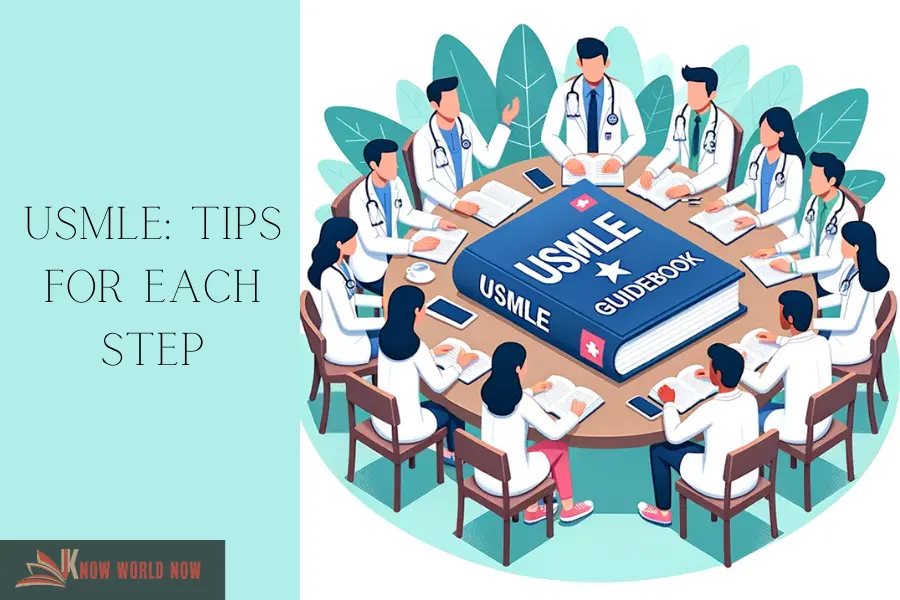The United States Medical Licensing Examination (USMLE) is a three-step examination for medical licensure in the United States. It assesses a physician’s ability to apply knowledge, concepts, and principles, and to demonstrate fundamental patient-centered skills, that are important in health and disease.
The examination is sponsored by the Federation of State Medical Boards (FSMB) and the National Board of Medical Examiners (NBME). The USMLE assesses a physician’s ability to apply medical knowledge and the understanding of clinical science necessary for the provision of patient care.
Through its rigorous assessment, the USMLE aims to ensure that candidates have the required competence to practice medicine safely and effectively.
USMLE Step 1
The United States Medical Licensing Examination (USMLE) poses a challenging series of three exams that can make or break medical students and graduates seeking to obtain their medical licenses. Without question, USMLE Step 1 is widely renowned as being the trickiest and most demanding of the three.
This test really challenges your grasp of the fundamental concepts in basic sciences in a way that few other exams can. That’s why being fully set up and strategizing is crucial to ace it. We’re diving into the nitty-gritty of this make-or-break test and sharing some juicy tips to help you maneuver through it with ease.
USMLE Step 1 is a grueling, marathon-like computer-based test packed with over 280 multiple-choice questions that’ll make your head spin. These questions are split into seven 60-min blocks that’ll have you grinding your brain for 40 answers each.
The exam digs into an expansive range of subjects, leaving no medical concept unexplored. It challenges your understanding of everything from anatomy and physiology to biochemistry, while also throwing pharmacology, pathology, microbiology, and the capricious behavioral sciences into the mix, keeping you on your toes and perhaps causing some bewilderment.
Its ultimate goal, of course, is to evaluate you, to see if you can take all the foundational science knowledge you’ve accumulated and apply it effectively to any clinical scenario that pops up.
Start Early
Studying tirelessly for USMLE, Step 1 is an absolute must, and the key is to get a head start. To be on the safe side, it’s better to kick off your prep six to nine months prior to the test day. By doing so, you’ll get ample time to dive deep into the dizzying amount of content that needs to be mastered, and avoid the frantic cramming that comes with waiting until the last minute.
Tutor’s Guidance
If you ever feel like you’re hitting a wall or getting swamped while preparing, don’t hesitate to reach out to your mentors, professors, or academic advisors for guidance. They might be able to provide a ton of helpful insights, study tricks, and keep you inspired. Speaking from personal experience, I’d love to share some tips that have worked with my USMLE tutor. So, now we will delve into the tutor-provided strategies that can assist you in acing this daunting exam with aplomb.
Being perfect
There’s just no telling what’ll pop up on the exam. The nitty-gritty details you have got to know might not even be found in any prep material, which makes it all the more daunting. On top of that, the USMLE Step 1 just went and switched to a pass/fail grading system, so there’s no such thing as acing it anymore. All in all, your main goal should be to pass the darn thing so that you can move up a notch.
High-profit topics
You’re gonna come across a boatload of inquiries on high-yield subjects. Keep in mind that each query carries equal weight and no deductions will be imposed for erroneous responses. Brace yourself for some head-scratching moments and staccato bursts of questioning.
The one-best-answer idea
The concept of finding the “One Best Answer” is crucial when approaching USMLE questions. It’s essential to identify the most suitable response, rather than simply choosing based on your whim. However, don’t make the mistake of selecting an answer in uncertainty. Instead, pick with confidence and avoid trying to second-guess yourself repeatedly, which only wastes time and causes unnecessary anxiety.
Procrastination
Try not to deviate too much from your plan. It can be quite a challenge to get back on the path once you do.
Caffeine
Don’t overly depend on alkaloid drinks, as becoming too reliant on them may lead to a crushing downfall in the future.
Day off
Make sure you always cut out some time for yourself to take a break from the grind of USMLE studying. Trust me, your brain will thank you for freeing up that precious RAM memory. So why not use your day off to do something fun and spend time with your loved ones? It’s important to recharge and unwind every once in a while.
Calendar
Create a foolproof schedule that maps out all the essential subjects. Allocate specific time frames for each topic, ensuring you have plenty of room for revision and fine-tuning. Keep it realistic and set achievable goals to avoid burnout.
Practice
To really come through in the USMLE Step 1, the key is consistent and unwavering practice. It’s basal to solve as many practice questions as you can, allowing yourself to become deeply entrenched in the exam format and elevating your problem-solving skills to the next level. Keep at it, and the path to success will become clearer with each question answered.
Understand
Although memorization is a key factor, it’s just as critical to fully comprehend the fundamental concepts. It’s common for USMLE Step 1 inquiries to necessitate the application of your knowledge to real-life medical situations. In order to achieve success, you should concentrate on grasping the mechanisms and principles that underlie the concepts.
Your Team
Gather up your pals and create your very own study squads. Team up with your peers to hash out those difficult topics, resolve pesky uncertainties, and exchange unique viewpoints.
Don’t forget that teaching others is a surefire way to solidify your grasp of the subject. Keep in mind that your fellow students are all muddling through the same stuff as you.
Everyone’s got those same anxious jitters and cognitive nags. Roaming around the library and finding other folks performing Herculean feats of braininess might just give you the inspiration you need. Remember, you’re not flying solo.
Breaks
Spending excessive amounts of time hitting the books can actually work against you. It’s important to regularly take breaks to loosen up, get some physical activity in, and recharge your batteries. By doing so, you can keep your concentration levels high and avoid experiencing exhaustion.
Entourage
As you inch closer to your exam day, why not consider simulating exam conditions by taking full-length practice tests? Doing so can help you acclimatize to the time constraints and toughen up for the actual exam. Afterward, scrutinize your performance and zero in on sections that require.
Exam Changes
The USMLE goes through intermittent revisions, making it paramount to stay in the loop regarding any alterations to the examination structure or content. Check out the official USMLE website and enlist in pertinent message boards or bulletins to stay abreast of the freshest developments.
USMLE Step 2
The USMLE Step 2 is a monumental benchmark for any medical student aspiring to practice medicine within the United States. This comprehensive assessment evaluates a candidate’s ability to effectively utilize their medical expertise, skills, and clinical judgment in practical scenarios. Given the immense consequence of this exam in determining one’s readiness for clinical practice, it is imperative to approach it with an unyielding and resolute attitude.
Structure
To finely tune your study approach for Step 2, consider acquainting yourself with its format and content. This will provide you with the insight needed to identify your strengths and weaknesses. The exam, divided into two parts – Step 2 Clinical Knowledge (CK) and Step 2 Clinical Skills (CS) – can be customized once you have a better understanding of them. Take note, this test is no walk in the park and definitely requires a tailored approach. Along with the aforesaid pointers, there’ll be certain ones earmarked solely for the USMLE Step 2 that are going to be throwing a bit of a curveball.
Clinical Skills
The Step 2 CS test evaluates how well you can effectively communicate with patients, gather their medical histories, and conduct physical exams. If you want to ace this part, you need to work hard at improving your clinical skills every day. Focus on developing your ability to connect with patients, active listening, and expressing your thoughts in a clear and compassionate manner. Don’t be afraid to ask for feedback from your colleagues, mentors, or instructors to enhance your patient communication skills.
Evidence-Based Medicine
The USMLE Step 2 exam puts a major emphasis on evidence-based medicine, so make sure you’re up to speed on the latest clinical guidelines, research findings, and treatment options. Familiarize yourself with common health conditions, their pathophysiology, and management techniques.
Incorporating evidence-based medicine into your study routine is a must if you want to be fully equipped to tackle any clinical scenarios that may arise on the test. It may seem overwhelming, but staying current with the most recent advancements is crucial for acing the exam.
USMLE Step 3
The last hurdle is gauging a candidate’s knack for putting medical know-how and grasp of biomedical and clinical science into action. This involves tackling computerized questions with multiple-choice options and case scenarios that are played out on a computer screen.
The assessment is spread across two days, each with a different focus. On Day 1, you’ll face queries that hinge on fundamental science; on Day 2, you’ll zero in on the clinical side of things. Granted, both days are part of the same exam, but they demand distinct skills and prep for navigation with flying colors.
Step 3, Day 1
On day one of the USMLE Step 3, you’ll face a real marathon with six blocks of questions containing 38–39 questions each. You’ve got one hour for each block, with 45 mins of break time during the test day. It’s a non-stop, seven-hour grind. Brace yourself, because the first day of the Step 3 exam will test your knowledge of basic medical and science concepts, like ethics, fundamental principles, biostatistics, and medical literature.
The first day is purely multiple choice, much like the USMLE Step 2 exam. But here’s the kicker: you’ll also have to navigate through the scientific abstracts and pharmaceutical advertisements, which can be a real thorn in your side.
Step 3, Day 2
USMLE Day 2 of Step 3 is quite a doozy. It entails an intense 9-hour exam, where you’ll be put through the wringer with 6 blocks of 30 questions each and then, to add more confusion and complexity, 13 heart-wrenching, cases that’ll make you scratch your head and think, “what the heck?” You’ll encounter a combination of multiple-choice questions and those pesky computer-based case scenarios, which are highly unpredictable and can cause a sudden burst of anxiety.
On Day 2, things get really complicated with all the focus on diagnosis, management, and making tough medical decisions. You can’t afford to second-guess or slack off for a second. You’ve got just 45 mins to knock out each block and only a measly 10–20 mins to simulate each case, enough to make anyone’s anxiety skyrocket.
But fret not! You’re given a minimum of 45 mins for break time, so use it well and come back stronger. As you gear up for Step 3, do yourself a favor and practice as much as possible. Make sure your time management skills are on-point, and you’re able to complete all queries within the allotted time.
And here’s a savvy trick—always save the drug-related questions till the very end of the block. It could make all the difference, folks.



